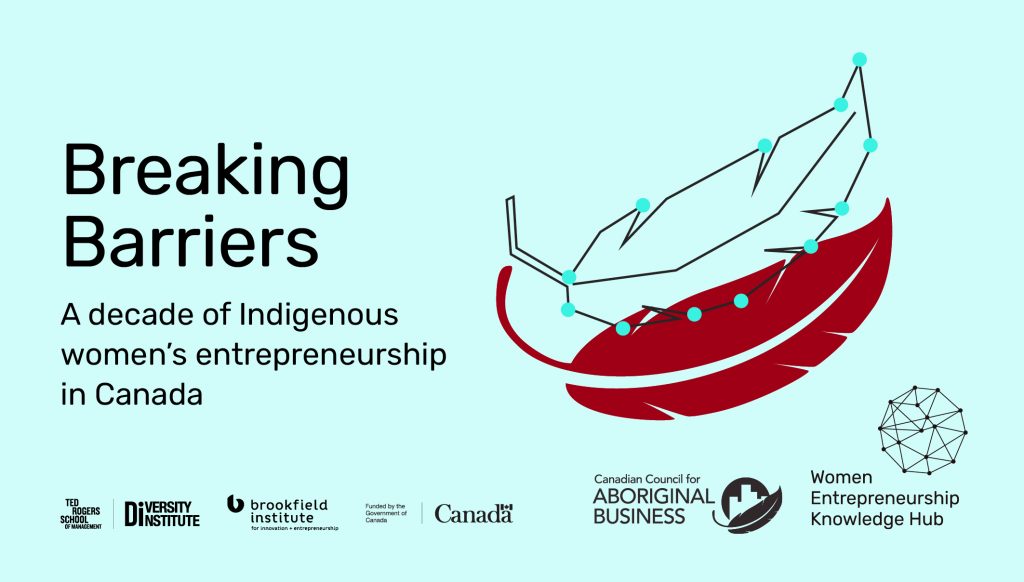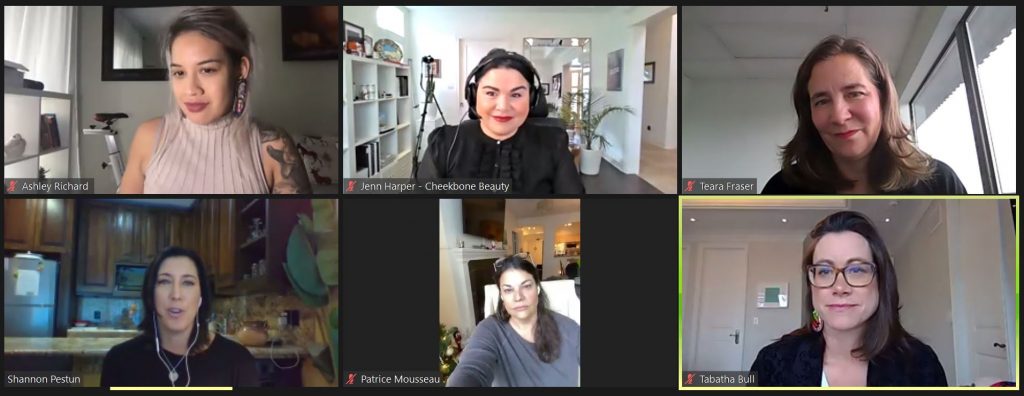Breaking Barriers: Indigenous Women Entrepreneurship & the Power of Community
Indigenous women entrepreneurs who are supporting their communities while making their mark on our skies and helping thousands feel more comfortable in their own skin recently joined us to share their stories at the launch of a new report published by the Women Entrepreneurship Knowledge Hub (WEKH) alongside the Canadian Council for Aboriginal Business (CCAB).

Breaking Barriers: A Decade of Indigenous Women’s Entrepreneurship in Canada examines data from Aboriginal business surveys conducted by CCAB over the past decade. Teara Fraser (LEO & Founder, Iskwew Air), Jenn Harper (CEO, Cheekbone Beauty), Patrice Mousseau (CEO & Founder, Satya Organic Skin Care), and Ashley Richard (WEKH Indigenous Outreach and Partnership Lead) joined moderator Shannon Pestun, Senior Advisor, Banking & Finance at WEKH, to talk about the research and to share their experiences as Indigenous women entrepreneurs. Tabatha Bull, President and CEO of the CCAB, also joined the panel to conclude the webinar.
The new research provides an important profile of Indigenous women-owned businesses, as well as the unique challenges that Indigenous women entrepreneurs face. It also begins to build an understanding of how Indigenous women entrepreneurs use traditional knowledge and traditional cultural expression as part of their entrepreneurial pursuits.
Samantha Morton and Kaira Jakobsh from CCAB set the stage for the ensuing discussion by sharing highlights from the research, including:
- Women-owned Indigenous businesses are more likely to have a staff with a higher proportion of Indigenous people or consisting entirely of Indigenous individuals
- The proportion of women-owned Indigenous businesses with employees has nearly doubled over the last decade, from 23% in 2010 to 42% in 2019
- The number of Indigenous women entrepreneurs incorporating their businesses, as well as those reporting revenues topping $1 million, has grown
- Indigenous women entrepreneurs are more likely to export to the United States compared to their male counterparts and are more likely to use traditional knowledge or traditional cultural expression
- Indigenous women entrepreneurs were more likely to experience a “very negative” impact on their businesses from COVID-19 and experience a drop in revenue of more than 50%
This report puts forth a series of recommendations to help create a more inclusive ecosystem to support Indigenous women in their economic and social pursuits. These recommendations underline the importance of training a gender and diversity lens on any potential solutions or interventions.
“There are unique strengths and challenges that Indigenous women entrepreneurs face, and programs and research needs to be designed with that in mind,” explained Samantha Morton.
Indigenous Women Entrepreneurs Making Their Mark

“Our panelists know first-hand what it means to break through barriers,” said Shannon Pestun.
Ashley Richard began the discussion by emphasizing that this report clearly shows that Indigenous women create jobs and educational opportunities for their local communities. As Indigenous women entrepreneurship grows across the country, so too does the number of Indigenous role models that other Indigenous women and girls can see building success and agency through entrepreneurship. Importantly, Indigenous women entrepreneurs also play a central role in preserving Indigenous cultures by incorporating traditional knowledge and traditional cultural expression into their businesses.
“That’s so powerful. Not only by supporting Indigenous women are you boosting the entire Canadian economy, but you are also helping to preserve Indigenous culture,” Richard noted.
Our panelists demonstrate this to be true. For Teara Fraser, it begins with the name of her business. “Iskwew” is a Cree word for “woman.” Fraser chose that name as an act of reclamation: “Reclamation of language, reclamation of matriarchal leadership, and reclamation of womanhood.” Iskwew Air also has protocols around honouring and acknowledging the territories they fly into, and works closely with Indigenous communities they fly into.
Both Jenn Harper and Patrice Mousseau use Indigenous language as part of their businesses too, and center sustainability and traditional methods in their business practices. Cheekbone Beauty uses Indigenous words to name their products, with lipsticks entitled “Askîhk” and “Kéyah,” in turn shedding light on their meanings and spreading awareness of Indigenous languages. The word “Satya” means “to find truth.”
Looking back, each entrepreneur struggled to finance their companies at the early stages of their journeys—a challenge many Indigenous women entrepreneurs face. Harper spent three years building Cheekbone Beauty alongside a full-time job before seeking financing elsewhere. She explained that this period was an important opportunity to develop her entrepreneurial skills and prove that her business had a place in the market.
Both Fraser and Mousseau underlined the value of building a close relationship with a financier when seeking external funding. Mousseau suggests that early stage entrepreneurs seek out local credit unions to build those relationships that they may not be able to find at a mainstream financial institution. Fraser has also found success as part of the SheEO community, which is providing women entrepreneurs with new ways to access financing on their own terms.
“If we’re at the bottom of a mountain with a white guy, we’re carrying an extra 200 pounds and we’re trying to keep-up pace. Let’s recognize that we need the supports to be able to take that weight off so that we can actually compete with these great ideas and these incredible innovations that Indigenous people, and particularly Indigenous women, are creating right now,” Mousseau explained.
The outbreak of COVID-19 threatened to derail their efforts. “There was a point when I thought, ‘I don’t know if I can make it through this,’” recalled Fraser. She soon decided that that was not the story that people would tell about Iskwew Air, and her business continues operating throughout the crisis to help Indigenous communities however they can. Fraser has successfully led the AirLIFT crowdfunding campaign alongside the Indigenous LIFT Collective, flying essential goods and supplies to Indigenous communities in British Columbia.
Harper and Mousseau faced challenges in the supply chain that deeply impacted their businesses. For instance, the price of the calendula flowers that Satya Organic uses in their skin care products skyrocketed as harvesting halted. Harper needed to postpone a new product launch as one supplier shut-down their operations entirely. Both entrepreneurs were forced to quickly pivot to adapt to this new landscape and respond to new market needs as consumers spend more time wearing masks and washing their hands.
Looking ahead, panelists emphasized the importance of community and collective support for Indigenous women entrepreneurs to succeed while sharing their hopes for the future.
“I am resolving to make sure that every Indigenous woman, every Indigenous youth, feels like they matter, that their business, their idea—whatever they want to build—has a space in this world, and that they have everything that they need to accomplish that. There are so many people here ready to hold their hands, pull them up, and show them the way,” explained Harper.
Mousseau echoed this sentiment and added, “You cannot go out and do it alone. This guilt that we all have about not doing everything is ridiculous. The only way that we can really be successful in this world, and be good, complete and happy in ourselves is if we have community around us.”
Richard concluded that the future of an inclusive innovation ecosystem needs to be driven by Indigenous women. “Indigenous women have the knowledge of what is needed in their community, they just need to be given the supports to make these ideas a reality,” explained Richard.
Learn more
Watch the webinar on-demand to hear more about Breaking Barriers: A Decade of Indigenous Women’s Entrepreneurship in Canada and additional insights from our panelists.
We invite you to download the report and learn more about how our See It. Be It. campaign is striving to erase stereotypes about entrepreneurship that push diverse women away by highlighting the stories of inspiring women entrepreneurs, including Teara Fraser, Jenn Harper, and Patrice Mousseau.
